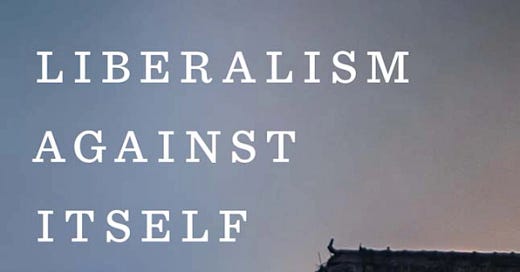“Liberalism Against Itself: Cold War Intellectuals and the Making of Our Times” (2023) by Samuel Moyn
Anand Atre
Samuel Moyn’s latest book stands out as a unique and thought-provoking piece that disrupts the prevailing narratives of Cold War liberalism. Moyn’s approach is distinct, delving into the psychological climate and intellectual influence that birthed the ideology. His central argument is that an excessive focus on defeating socialism and communism, coupled with an overreaction to the Soviet threat, transformed liberalism into an ideology devoid of hope for the future and embodying an ethos of damage control and survivalism. Moyn asserts that this configuration of liberalism remains the dominant one today.
Moyn elucidates several themes in Cold War liberalism, including rejecting Hegel’s and Marx’s emancipatory premises for humans, abandoning Enlightenment principles, and repudiating historicism. These convictions manifested via scapegoating Rousseau, the Enlightenment, or Romanticism as the fons et origo of totalitarianism in the 20th century and purging those concepts from the liberal canon. As a result, Cold War liberalism repudiates the prospect of creative agency having any utility. Consequently, this version of liberalism focuses more on building barriers against tyranny than collective human emancipation.
Moyn opts against critiquing the thoughts of renowned Cold War sages such as Raymond Aron, Richard Hofstadter, or Arthur Schlesinger as convenient ‘straw men’ to direct his arguments toward. Instead, he delves into showcasing the intellectual formation of Cold War liberalism by examining the development and contrasting the ideas of Hannah Arendt, Isaiah Berlin, Gertrude Himmelfarb, Karl Popper, Judith Shklar, Jacob Talmon, and Lionel Trilling. Despite the deviations in these thinkers’ writings over time, Moyn makes a compelling case for how their thoughts evolved into Cold War liberalism. The vital commonality was cleansing liberalism of any notion of progressivism and perfectionism and presenting a significantly tempered version, one more akin to conservativism in everything but name. In addition to dismissing the universal human liberation project, Moyn points out that these thinkers were silent on Western-supported authoritarianism that hindered the decolonization and self-determination of the Global South. Moreover, they also denied, ignored, rationalized, or downplayed the crimes committed by the U.S. and its allies during the Cold War. As such, by persisting in blaming social justice movements as a stepping stone to tyranny and prejudging progressive ideals as unavoidably producing atrocities, Moyn demonstrates how Cold War liberal thinkers had a significant blind spot to the harm their ideology caused and the hypocrisy in their convictions.
There is an argument that pre-Cold War liberalism’s entanglement with imperialism, expansionism, racial hierarchies, and laissez-faire economics had already begun disinheriting its universal emancipatory principles before the Cold War. Being hermetically stuck in ethnic particularism indicates that even before the Cold War, liberalism had gradually morphed into liberalism only for white people. In this context, the crux of Cold War liberal thought caused liberalism to morph into a strict aversion to altering the structural functionalism of the Western World, with the goal being to safeguard its earned liberties against the rest of the world. Far from offering any hope for the future, Moyn adduces that the ideas expounded by Cold War liberal thinkers merely paved the way for continuing to look for more enemies, both overseas and domestic. The upshot was a nullification of human self-creativity in exchange for the ongoing applicability of Cold War liberal principles to each successor threat, including postmodern relativism and ‘woke tyranny.’
Moyn posits that Cold War Liberal writings laid the foundations for Ronald Reagan’s dismantling of the welfare state and created conditions for neoconservatism and neoliberalism to thrive. Furthermore, Moyn declares that Western education systems continue to lionize without critically engaging with the Cold War liberal thinkers and their disciples, who dominate the Anglo-American public intellectual sphere.
The absence of intellectual humility leads Cold War liberal thinkers to continue to parrot that ‘all the other’ alternatives are worse, which is nothing more than a reductionist rationalization and amounts to a failure to recognize or understand the damage the ideology has done and continues to do. In addition to precluding liberalism from being a liberation movement, Moyn suggests that Cold War liberalism also has horrendous consequences for local and global politics. These include the liberal tradition losing its credibility to find solutions to address rising populism or the significant challenges facing the millennials and post-millennials, such as economic inequality, unending wars, and environmental catastrophes.
Moyn argues that for liberalism to refashion itself and regain its prominence, the revitalization of 19th-century liberal dispositions such as a free community of equals, creative self-making, and a willingness to embrace a public commitment to the highest life is crucial. These ideas echo some of the thoughts of Benjamin Constant, John Stuart Mill, and Alexis de Tocqueville. Embracing these sentiments would necessitate moving away from the reasoning that sees progress through a dichotomous prism as deterministically impossible or inevitable. Ultimately, Moyn intimates that transforming the fear felt by Cold War Liberals into Tocquevillian ‘salutary fear’ can inspire the use of agency to create possibilities, not certainties, for a brighter future.
Moyn’s critical engagement provides an alternative perspective on the ideas of several thinkers covered in liberal arts classes. Moreover, his erudite analysis presents actors with fruitful lines of inquiry they can use to concretize the forgotten tenets of liberalism into 21st-century actions. For the individuals who accept his critique, the hope of a refurbished optimistic liberalism encompassing creative agency could be the impetus to inspire commitments to universalizing freedom and human dignity in an increasingly divisive and polarized world.
Nevertheless, it behooves individuals looking to revamp liberalism without succumbing to the terrors that went hand in hand with notable historical revolutions to heed Mikhail Bakunin’s insight that “idealism is the despot of thought just as politics is the despot of will.” Consequently, the onus on reconstructing liberalism is to use agency to abstemiously refashion it without throwing the baby out with the bathwater. Doing otherwise would merely continue to fuel the fire championing Cold War liberalism.




